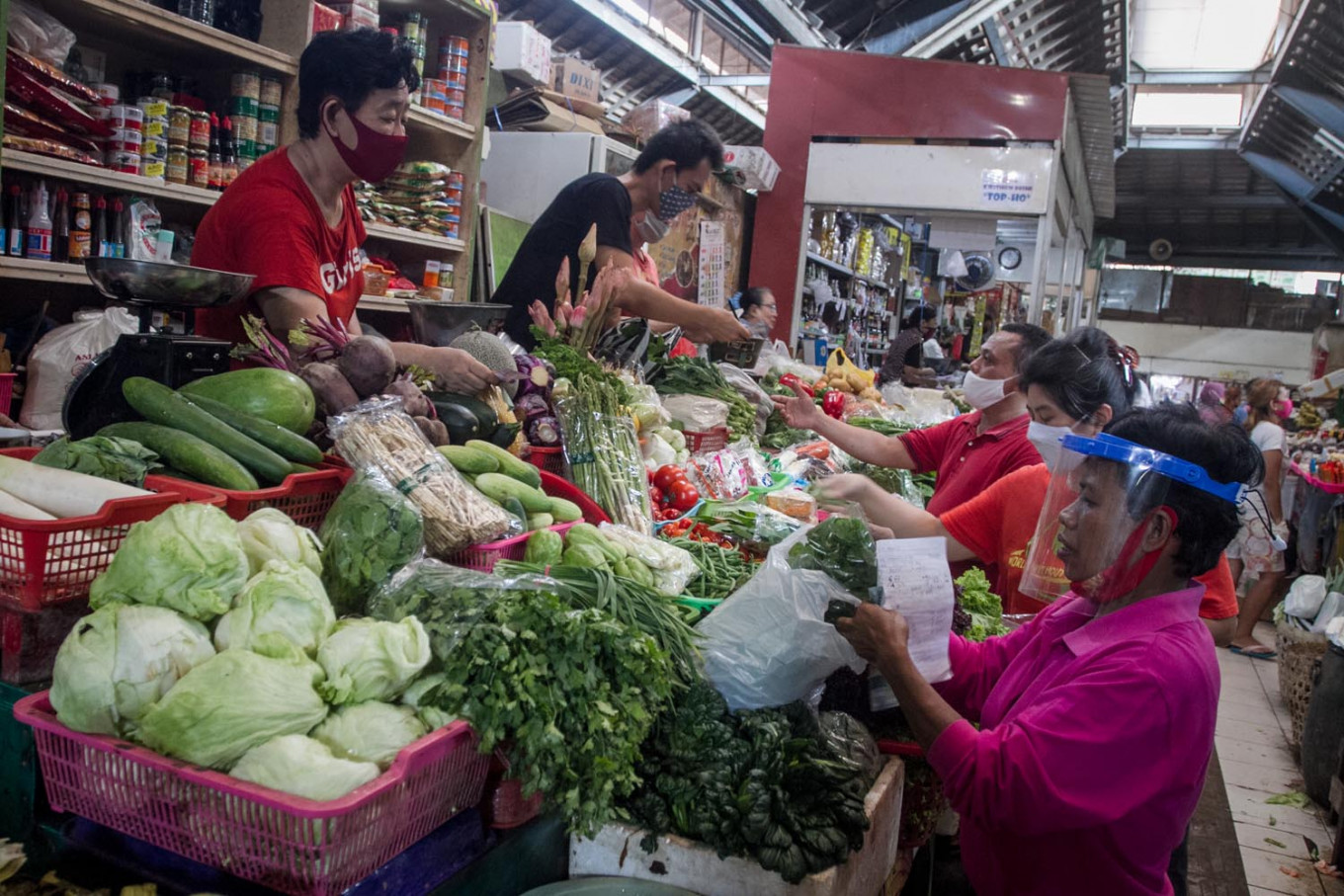Popular Reads
Top Results
Can't find what you're looking for?
View all search resultsPopular Reads
Top Results
Can't find what you're looking for?
View all search resultsDeflation recorded for record third month
Change text size
Gift Premium Articles
to Anyone
I
ndonesia is likely to see a deeper economic contraction in the third quarter as the country has recorded a decline in three consecutive months for the first time since the 1999 Asian financial crisis, signaling weak purchasing power.
The consumer price index (CPI) fell 0.05 percent in September from a month earlier, driven by lower airline fares and food prices. Deflation stood at 0.05 percent month-on-month in August after 0.1 percent monthly deflation in July, according to Statistics Indonesia (BPS) data.
On that basis, Indonesia’s annual inflation stood at 1.42 percent in September, far below Bank Indonesia’s (BI) target of 2 to 4 percent this year.
“The supply side is strong enough but unfortunately, purchasing power remains weak,” BPS head Suhariyanto told reporters during a virtual presser on Thursday.
“The COVID-19 pandemic has delivered a blow to the demand side as social restrictions to curb the virus’ spread has reduced purchasing power.”
September’s core inflation rate, which excludes volatile food and government-controlled prices, was 1.86 percent year-on-year (yoy), below the 2.03 percent rate in August, signaling sluggish demand for goods. Administered prices were up 0.63 percent yoy, while volatile prices recorded an annual inflation of 0.55 percent.
The pandemic has caused an economic fallout that has hit Indonesian consumers hard, with millions losing their jobs and falling into poverty amid slowing business activity.
Household spending, which accounts for more than half of Indonesia’s gross domestic product (GDP), fell 5.51 percent yoy in the second quarter, compared with annual growth of 5.18 percent in the same period last year, BPS data shows.
As a consequence, the country’s GDP shrank 5.32 percent in the same period and is widely expected to enter recession in the third quarter. A recession is marked by annual economic contractions in two consecutive quarters.
The government now projects the economy to shrink by 0.6 percent to 1.7 percent this full year, which would mark the first economic contraction in two decades.
The decline in consumer prices reflects low demand for goods and services, along with a fall in commodity prices amid the harvest season, said Bank Permata economist Josua Pardede.
“The spending rate of higher-income citizens, which contributed around 45 percent of total national spending, has been limited since the beginning of the pandemic,” he added.
“On that basis, we expect that the GDP will contract again but at a slower pace compared with the second-quarter slump.”
He forecast the economy to further shrink by 2.75 percent to 3.5 percent in the third quarter.
BPS figures show that the monthly deflation was mainly due to the falling prices of poultry, shallots and air travel, among other things. The steepest deflation in September was recorded in food, beverage and tobacco prices (0.37 percent), as well as transportation prices (0.33 percent).
The transportation sector, especially the aviation industry, has been hit hard by the pandemic as most consumers prefer to stay at home to avoid catching the highly contagious disease. The International Air Transport Association (IATA) estimates that Indonesia’s aviation industry will suffer a 49 percent passenger drop and an US$8.2 billion plunge in revenue this year from 2019.
“Core inflation is prone to keep flagging due to fewer economic activities as the pandemic has severely hit both the demand and supply sides,” Bank Mandiri economist Andry Asmoro wrote in a research note on Thursday, projecting the GDP to further plunge by 1.5 percent to 3 percent in the third quarter.
“Inflation will be lower than BI’s target because of plummeting domestic demand […] This will support the central bank to continue having accommodative monetary policies going forward.”
He added that the inflation rate might reach 1.95 percent by the end of this year.
The central bank has slashed a total of 100 basis points from its benchmark rate in four cuts this year in an effort to help the government kick start the sluggish economy. BI has vowed to maintain its accommodative monetary policy to maintain economic stability and support the recovery.
Finance Ministry Fiscal Policy Agency head Febrio Kacaribu said on Thursday that the economy was expected to recover in the third quarter, though not as fast as previously expected.
“The deflation figure shows us that the demand side has yet to recover and social protection programs must be continued,” he told reporters on Thursday. “The government must be vigilant in monitoring the trends on the demand side.”










